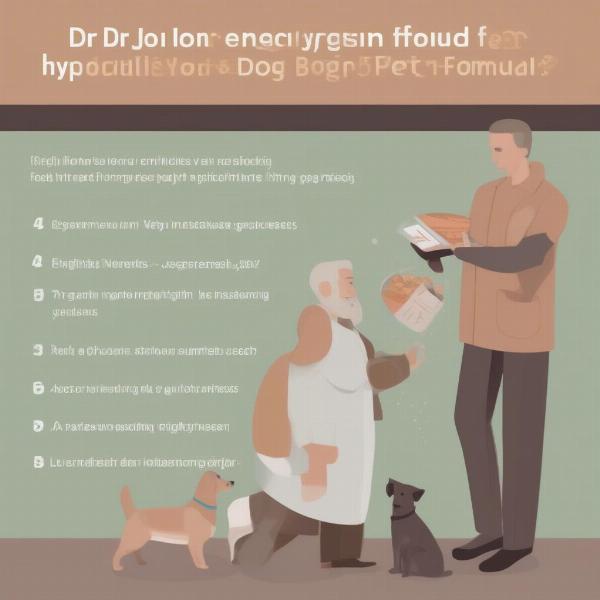Dr. John hypoallergenic dog food is a popular choice for pet owners seeking to manage food allergies in their canine companions. This comprehensive guide delves into the benefits, ingredients, and considerations surrounding Dr. John hypoallergenic dog food, empowering you to make informed decisions about your dog’s nutritional needs. We’ll explore the science behind hypoallergenic diets, discuss how to transition your dog to a new food, and provide practical tips for managing food allergies.
Understanding Hypoallergenic Dog Food
What exactly does “hypoallergenic” mean when it comes to dog food? It signifies a diet formulated to minimize the risk of triggering allergic reactions. Common allergens in dog food include beef, chicken, dairy, wheat, and soy. Dr. John hypoallergenic dog food typically replaces these ingredients with novel proteins and carbohydrates, such as hydrolyzed protein, venison, duck, or salmon, and sweet potato or rice. These less common ingredients are less likely to cause an allergic response in sensitive dogs.
Benefits of Dr. John Hypoallergenic Dog Food
Choosing a hypoallergenic diet like Dr. John can bring about significant improvements in your dog’s health and well-being. Here are some key benefits:
- Reduced Allergic Reactions: The primary benefit is the reduction of allergy symptoms, such as itching, skin irritation, ear infections, and digestive upset.
- Improved Skin and Coat Health: Hypoallergenic diets can lead to healthier skin and a shinier coat.
- Better Digestion: Novel proteins and carbohydrates are often easier for dogs to digest, leading to improved stool quality.
- Enhanced Overall Well-being: By alleviating allergy symptoms, these diets contribute to a happier and more comfortable life for your dog.
Choosing the Right Dr. John Hypoallergenic Formula
Dr. John likely offers a range of hypoallergenic formulas, each tailored to specific needs. Consider factors such as your dog’s age, breed, activity level, and specific sensitivities when selecting a formula. Consulting with your veterinarian is crucial to determine the best option for your furry friend.
 Choosing the right Dr. John Hypoallergenic Formula
Choosing the right Dr. John Hypoallergenic Formula
Transitioning to Dr. John Hypoallergenic Dog Food
Switching your dog to a new food should be a gradual process to prevent digestive upset. Start by mixing a small amount of the new food with their current food, gradually increasing the proportion of Dr. John over 7-10 days. Monitor your dog closely for any signs of adverse reactions during the transition.
Managing Food Allergies in Dogs
While Dr. John hypoallergenic dog food can significantly help manage food allergies, a holistic approach is often necessary. This includes:
- Veterinary Guidance: Work closely with your vet to diagnose and manage your dog’s allergies.
- Elimination Diet: Your vet may recommend an elimination diet to pinpoint specific allergens.
- Environmental Control: Minimize exposure to other potential allergens, such as dust mites and pollen.
- Regular Grooming: Keep your dog’s skin clean and free of irritants.
Conclusion
Dr. John hypoallergenic dog food offers a valuable solution for dogs suffering from food allergies. By understanding the benefits, ingredients, and proper transition process, you can help your canine companion live a healthier, more comfortable life. Remember to consult your veterinarian for personalized advice and guidance.
FAQ
- What are the most common dog food allergens? Common allergens include beef, chicken, dairy, wheat, and soy.
- How do I know if my dog has a food allergy? Symptoms include itching, skin irritation, ear infections, and digestive issues. Consult your vet for diagnosis.
- How long does it take to see results with hypoallergenic dog food? It can take several weeks to notice improvements in allergy symptoms.
- Can I give my dog treats while on a hypoallergenic diet? Choose hypoallergenic treats to avoid triggering allergic reactions.
- Is Dr. John hypoallergenic dog food expensive? The cost varies depending on the specific formula and retailer.
- Where can I buy Dr. John hypoallergenic dog food? Check with your local pet stores or online retailers.
- What if my dog doesn’t like Dr. John hypoallergenic food? Try different flavors or consult your vet for alternative options.
About ILM Dog
ILM Dog is your trusted resource for all things dog-related. We provide expert advice and practical guidance on dog breeds, health, training, nutrition, grooming, and much more. We are dedicated to helping you navigate the joys and challenges of dog ownership. For expert advice and personalized recommendations, contact us via email at [email protected] or by phone at +44 20-3965-8624.